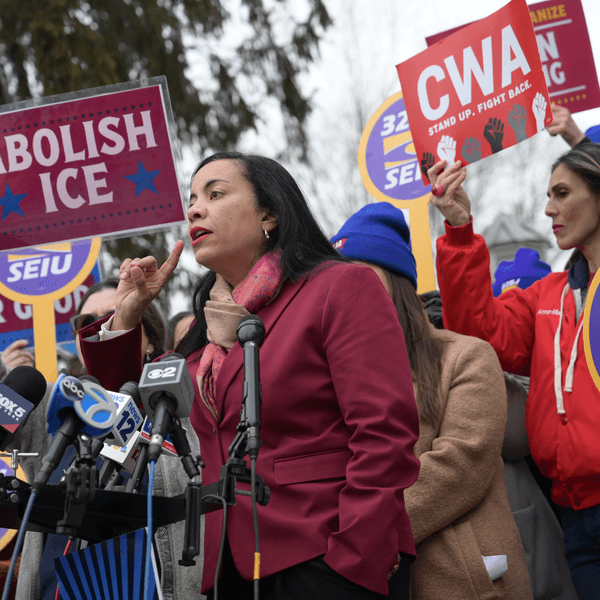The resounding victory of former leftist rebel Gustavo Petro in one of Colombia's presidential primary elections on Sunday is being hailed as the latest sign of a resurgence of progressive Latin American leadership reminiscent of the so-called "pink tide" of the 1990s and 2000s.
"The leaders of the new pink tide hope to rewrite the rules of their democracies."
Petro--a senator representing the Humane Colombia Party and a former mayor of Bogota who in the 1970s and '80s fought with the pro-democracy M-19 revolutionary movement--secured the Historic Pact coalition nomination for president with more than 80% of the primary vote.
"The Historic Pact has achieved the best result of progressivism in the history of the republic of Colombia," Petro said Sunday. "We are on the verge of winning in the first presidential round."
"As of tomorrow, the first presidential round begins," Petro continued. "We will defend a common program to turn Colombia into a power of life and make the economy revolve around life... Loving the people today means building peace, social justice, and a society of rights."
Petro is widely viewed as the front-runner among five candidates in the upcoming May 29 presidential election. His competitors include former Medellin Mayor Federico Gutierrez of the right-wing Team Colombia coalition; Sergio Fajardo, another former Medellin mayor representing the centrist Hope Coalition; and Democratic Center candidate Oscar Zuluaga, the hand-picked choice of current President Ivan Duque, who cannot run for a second term under a law enacted in 2015.
Also running are populist independent Rodolfo Hernandez of the Anticorruption League and centrist Ingrid Betancourt, who was held hostage by Revolutionary Armed Forces of Colombia (FARC) rebels for six years.
If no candidate receives 50% of the vote on May 29, the top two finishers would face a runoff election the following month. If he were to win, Petro--who finished a distant second to Duque in the second round of the 2018 presidential election--would be the first leftist president in Colombian history.
Petro is running on a platform that includes a promise to raise taxes on corporations and large landowners, possible property redistribution to landless peasants, an end to fossil fuel exploration projects, and a guaranteed annual income.
Some progressives have called on Petro to choose Afro-Colombian human rights and environmental activist and 2018 Goldman Environmental Prize recipient Francia Marquez, who despite being excluded from many polls, still placed second in the Historic Pact primary and third among all primary candidates, as his running mate.
"Beyond the place I occupy, my priority is the people," Marquez tweeted Monday. "We are going to give birth to dignity for this country and we are going to go from resistance to power."
Historic Pact also won the largest percentage of the vote in concurrent elections for the Senate and House of Representatives, according to teleSUR.
The election of Mexican President Andres Manuel Lopez Obrador in 2018 Argentinian President Alberto Fernandez the following year is held to have portended what numerous observers are calling a second "pink tide," a reference to the previous leftward turn in Latin American politics that started with the ascendance of Venezuela's Hugo Chavez in 1998.
The presidential victories of Luis Arce in Bolivia, Pedro Castillo in Peru, Xiomara Castro in Honduras, and Chile's Gabriel Boric--as well as the auspicious prospects for Petro and Luiz Inacio Lula da Silva in this year's Colombian and Brazilian elections, respectively--are widely viewed as further evidence of a second "pink tide."
Related Content
Progressives Worldwide Applaud New Hope for Chile as President Gabriel Boric Sworn In
Brett Wilkins
However, Thea Riofrancos and David Adler warn of "the threat of a rejuvenated and authoritarian right," which has adopted "tactics from the U.S. Republican Party" in a bid to thwart the left. These include "fake news, false claims of electoral fraud, and a commitment to stymie the legislative agenda of their opponents," as well as "capturing, corrupting, and deploying the judicial system" in the type of "lawfare" that led to the imprisonment of da Silva and the removal of Petro as Bogota's mayor in 2013.
"The new generation of left leaders are not unaware of the threats these transformations pose to the progressive agenda," they write for The New Statesman.
Riofrancos and Adler continue:
That is why, in so many cases, their ambitions reach beyond the ballot box to the constitution itself. From Xiomara Castro's promise to convene a constitutional assembly as the president of Honduras, to Gabriel Boric's defense of Chile's own convention process, the leaders of the new pink tide hope to rewrite the rules of their democracies in ways that expand rights, deepen representation, and guard against the destabilizing effects of new structural, geopolitical, and party political circumstances.
"Here," they add, "the present tide not only resembles its predecessor, which saw constitutional referendums in countries such as Bolivia and Ecuador, but by incorporating the bold ideas of its Indigenous, feminist, and environmental movements, the present generation also learns from the past--not just defending, but deepening democracy in the region."





